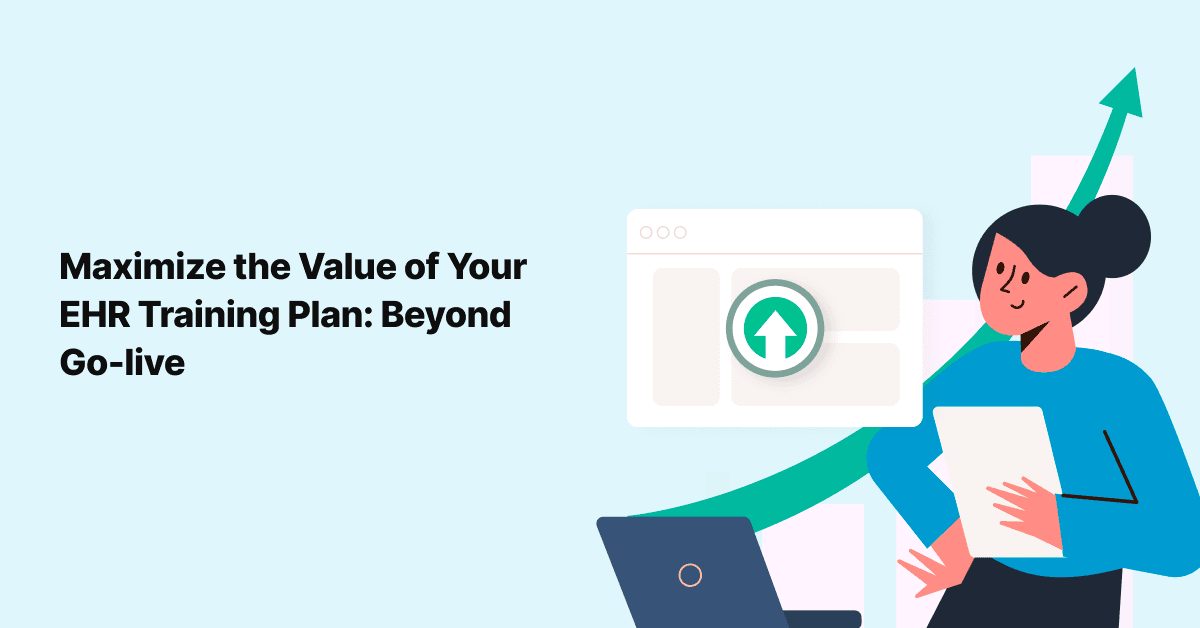
Blended Learning is the Future of Training
One of the most common sayings in learning and development is, “You never stop learning,” and we couldn’t …

Electronic Health Records (EHRs) have ushered in a new era of healthcare, transforming patient care, data management, and operational efficiency. While go-live training marks a pivotal moment in EHR implementation, the true journey toward success extends far beyond this initial phase.
Beyond the excitement and challenges of go-live, lies a comprehensive journey towards realizing the full potential and value of EHR systems. It is a journey that involves continuous learning, adaptation, and strategic planning, with the ultimate goal of achieving exceptional patient care, data accuracy, and operational excellence. In this blog, we will explore the crucial steps and strategies that healthcare organizations can employ to navigate this journey successfully and ensure that their EHR training plan goes far beyond the initial go-live phase.
What this blog covers:
Before delving into the challenges post-go-live, let’s underscore the central role played by your EHR training plan. It serves as the foundation for your organization’s EHR adoption, encompassing more than just the initial go-live training; it is a holistic strategy for perpetual learning and development.
Learn more about The Importance of an EHR Training Plan here.
Go-live training marks the beginning of your EHR journey. It equips your staff with the critical knowledge and skills needed to navigate the new EHR system effectively. This not only minimizes disruptions but also fosters a seamless transition, reducing errors and allowing a greater focus on patient care. It is the inaugural chapter of your EHR training plan, and its benefits are apparent right from the start. However, it is essential to acknowledge that these immediate benefits are just the beginning.
While the post-go-live phase presents opportunities, it also poses unique challenges that healthcare organizations must navigate. These challenges can significantly impact the success of your EHR training plan:
Healthcare is an industry with a significant degree of personnel turnover. Staff members may leave for various reasons, including career advancement or retirement. When new staff members join the organization, they need to be onboarded and trained on the EHR system. This can be a recurring challenge, especially in large healthcare facilities with a constantly changing workforce.
The processes and workflows in healthcare are not static. They evolve over time to accommodate changes in best practices, regulations, and technology. As workflows change, it’s crucial that staff members receive training to adapt to these modifications. Failure to do so can lead to inefficiencies, redundancies, and resistance to change.
EHR software vendors regularly release updates and enhancements to improve functionality, security, and compliance. While these updates are designed to benefit healthcare organizations, they can also pose challenges. EHR users must learn how to use new features, adapt to changes in the user interface, and ensure that their practices remain in compliance with evolving regulations. Without ongoing training, the introduction of new software updates can disrupt workflows and potentially lead to errors.
The process of implementing EHR systems, which often includes extensive training, can be mentally and emotionally taxing for staff. Post-go-live, there may be a sense of “change fatigue” where EHR users, having navigated the complexities of EHR adoption, resist further changes or training efforts. This can hinder the organization’s ability to implement additional improvements and optimizations to the EHR system.
Over time, healthcare organizations accumulate vast amounts of patient data within their EHR systems. Proper data management is essential to ensure the accuracy, relevance, and security of this information. However, without ongoing training, staff members may inadvertently mishandle data or fail to adhere to best practices for data maintenance and cleanup. This can lead to data inaccuracies, compliance issues, and increased security risks.
Healthcare providers often rely on a variety of software applications and technologies to support their operations. Integrating these systems with the EHR can be a complex task. Post-go-live, healthcare organizations may encounter integration challenges, such as data synchronization issues or interoperability problems. Addressing these challenges requires ongoing training to ensure that staff members can effectively manage and troubleshoot integration-related issues.
Intensive training during the EHR implementation phase can be demanding. Post-go-live, users may experience burnout or exhaustion due to the steep learning curve and the pressure to adapt to new workflows. Ongoing training should address not only technical skills but also strategies for mitigating burnout and maintaining staff morale.
EHR systems offer numerous opportunities for optimization, including customizing templates, automating workflows, and enhancing data analytics capabilities. Without ongoing training, healthcare organizations may fail to recognize and capitalize on these optimization possibilities, leaving valuable tools and features underutilized.
In the realm of EHR implementation, the secret to long-term success lies in your EHR training plan’s enduring commitment to ongoing training. It’s akin to fueling your car for a cross-country journey – without it, you risk stalling on the road.
At the core of healthcare lies the unwavering commitment to delivering exceptional patient care. Your EHR training plan plays a pivotal role in achieving this noble objective. When your EHR users engage in ongoing training as part of your EHR training plan, they gain the ability to swiftly access critical patient information, make well-informed decisions, and provide more precise diagnoses and treatments. Patients reap the rewards of expedited, more accurate care, resulting in improved health outcomes.
Efficiency is the hallmark of EHR systems, but these efficiency gains can only be harnessed when your staff becomes proficient in utilizing the software through your EHR training plan. Ongoing training empowers your team to become experts in their EHR system, reducing the time spent on administrative tasks and enabling them to redirect their energy toward direct patient care.
Compliance with stringent regulations, such as the Health Insurance Portability and Accountability Act (HIPAA), is non-negotiable in the tightly regulated healthcare landscape. Your EHR training plan plays a crucial role in this regard. Inadequate training can inadvertently lead to non-compliance, data breaches, and severe legal repercussions.
Your EHR training plan ensures that your EHR users are not only well-versed in the latest regulations but also equipped to implement them effectively. This proactive approach serves as a safeguard against non-compliance and data breaches, protecting patient information and preserving your organization’s reputation.
EHR technology is in a constant state of evolution. Software updates introduce new features, enhanced security measures, and workflow improvements. Your EHR training plan should encompass ongoing training to prepare your team for these changes. Continuous learning ensures that your team not only remains on par with technological advancements but is also prepared for the future.
Consider a scenario where a healthcare organization neglects ongoing training as outlined in its EHR training plan. When a significant software update arrives, users find themselves struggling with unfamiliar features and functionalities. In contrast, organizations that prioritize ongoing training as part of their EHR training plan seamlessly integrate new software updates into their workflows, reaping the benefits without causing disruption.
Your EHR training plan’s commitment to ongoing training is the cornerstone of success in the ever-evolving world of Electronic Health Records. It’s not just about a one-time go-live event; it’s a perpetual journey of learning and adaptation outlined in your EHR training plan that leads to enhanced patient care, operational efficiency, compliance, and readiness for what the future holds.
Given these challenges, how can your organization make the most of your EHR training plan in the post-go-live phase?
Here are some strategies to consider:
In summary, an EHR training plan that extends well beyond go-live is not just a luxury but a necessity in the digital healthcare landscape. It’s an investment in improved patient care, enhanced operational efficiency, compliance, and future readiness. By prioritizing ongoing training, your organization positions itself for sustained success and growth.
So, as you celebrate your EHR system’s go-live, remember that the real journey is just beginning. Keep the momentum going with ongoing training – your patients and your organization will thank you for it. In the ever-evolving world of healthcare, the commitment to learning is the bridge to a brighter, healthier future.
Join over 3,200 subscribers and keep up-to-date with the latest innovations & best practices in Healthcare IT.

One of the most common sayings in learning and development is, “You never stop learning,” and we couldn’t …

The healthcare industry has been challenged to a great extent due to the global health crisis caused by …

Every health system boasts an EHR training plan, but the critical question lingers: is it right on target? …